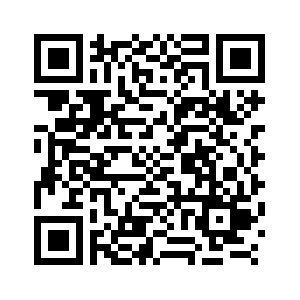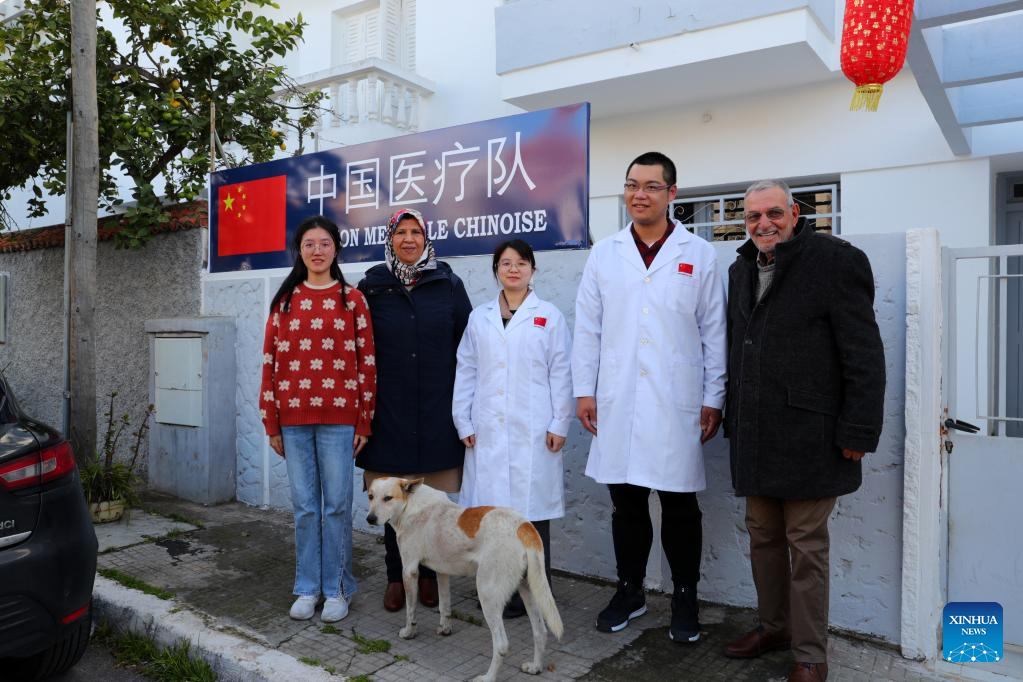
Members of a Chinese medical team in Mohammedia pose for a group photo with Arihe Maan (1st R) who comes for acupuncture therapy in Mohammedia, Morocco, on Feb. 27, 2023. For nearly half a century, Chinese doctors, mainly obstetrician-gynecologists, have earned a sterling reputation for their professionalism and dedication in some remote areas of Morocco. Many pregnant women from across the country come to seek medical advice and childbirth care from them. (Xinhua/Sui Xiankai)
by Xinhua writers Xu Supei, Wang Hao
RABAT, April 5 (Xinhua) -- Settat, a central Moroccan city, was still shrouded in the winter chill in late February. But inside an operating room in the Hassan II hospital, Chinese doctor Zhou Long was sweating while performing a difficult cesarean section (C-section) on a woman in labor whose baby was stuck in her pelvis.
After solving the obstructed labor, Zhou found out that the infant was not crying and immediately decided to take him to the neonatal emergency room. When the baby burst out crying after his respiratory tracks were cleared of fluid, Zhou and her colleagues were finally relieved.
"In Morocco, I've performed many C-sections that were far riskier than this," Zhou told Xinhua, citing that prenatal examinations haven't been promoted on a large scale in the country.
For nearly half a century, Chinese doctors, mainly obstetrician-gynecologists, have earned a sterling reputation for their professionalism and dedication in some remote areas of Morocco. Many pregnant women from across the country come to seek medical advice and childbirth care from them.
Of all the surgeries, one still sends shivers down Zhou's spine: a patient with umbilical cord prolapse.
"I was performing a routine vaginal examination for the mother-to-be when a long umbilical cord slipped into my hand like a slippery fish. To make matters worse, a violent uterine contraction happened, pushing the baby's head down," Zhou recalled.
She had to hold the baby's head while wheeling the patient into the operating room. The baby was born without heartbeats after an emergency C-section, but Zhou managed to restore the heartbeat with a round of cardiac compressions.
Worse, the power suddenly went out, plunging the operating room into darkness. That could be a nightmare for a new doctor, but Zhou did not panic and calmly stitched up the mother's belly under the dim light from a mobile phone.
After the operation, everyone was relieved, especially the patient's family, who expressed heartfelt thanks to the completely exhausted Chinese doctor.
Zhou's dedicated work has endeared her to Moroccan patients, some of whom regularly express their gratitude with homemade meals.
"One of my patients told me excitedly that all of her four children were delivered by Chinese doctors, and this time, she specially chose to come to the hospital when Chinese doctors were on duty," she said.
Zhou is a member of the 194th Chinese medical team sent to Morocco. Since 1975, a total of 1,944 Chinese medical personnel have been sent from the Chinese city of Shanghai to provide medical assistance to Morocco. So far, they have treated 5.78 million outpatient and emergency cases, as well as 800,000 inpatients in total.
Thanks to their medical skills and ethics, Chinese doctors have become invaluable assets to both local residents and Moroccan co-workers, who laud them for caring for the patients with love and teaching their Moroccan colleagues the skills without reservation.
Arihe Maan, a retired Moroccan accountant suffering from shoulder pain, is a frequent visitor to the Chinese medical team stationed in the western port city of Mohammadia. Since 1992, he has taken regular acupuncture therapies there to alleviate the pain.
"If I wasn't satisfied with the treatments, I wouldn't keep coming back," the 82-year-old man told Xinhua, while taking out a worn notebook with a detailed record of the acupuncture and massage therapies he received from Chinese doctors over the past 30 years.
"I have advised all my ailing friends to go for traditional Chinese medicine," Maan said. "Chinese doctors treat me with smiles and passion."
Fatima Laatiq, a resident in Settat, keeps a stack of photos that her family members took with Chinese doctors over the years. Since her first meeting with Chinese doctors in 1979 during a visit to the hospital, she has treated the Chinese doctors more like family members than medical professionals.
"When I cried from the pain after the surgery, a Chinese doctor wiped away my tears," Laatiq told Xinhua. "Chinese doctors do a great and noble job ... They work with their hearts, and that is what made me love them to this degree."
Achibet Mostafa, head of the Hassan II Hospital in Settat who has been working with Chinese medical teams for 30 years, said that China's dispatch of doctors is more important than providing material aid to Morocco.
"Despite the concrete improvement of the Moroccan health system made in the past 30 years, the shortage of medical personnel remains a critical problem we must overcome," Mostafa said.
Belmadani Abdelouahab, director of planning and financial resources in the Moroccan Ministry of Health, said the Chinese medical teams have been playing an important role in providing health care to Moroccans, especially those in remote areas.
"They are rooted in far-flung places, often in rural and mountainous areas. They all do a good job and we are pleased to cooperate with the Chinese medical teams," said Abdelouahab. ■
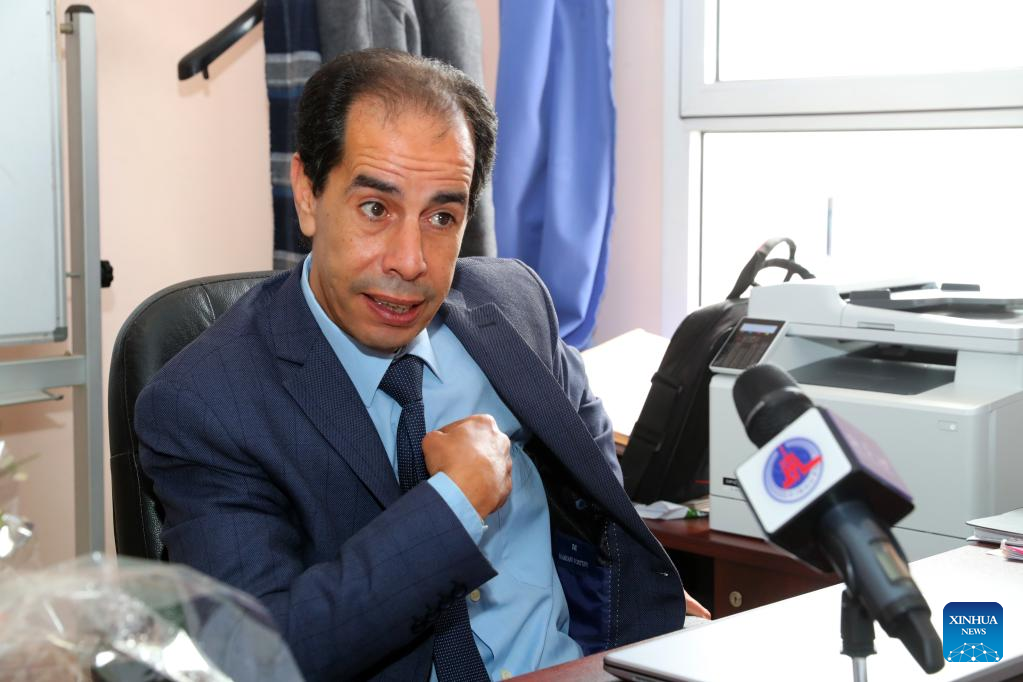
Achibet Mostafa, head of the Hassan II Hospital in Settat, is interviewed at the hospital in Settat, Morocco, on Feb. 27, 2023. For nearly half a century, Chinese doctors, mainly obstetrician-gynecologists, have earned a sterling reputation for their professionalism and dedication in some remote areas of Morocco. Many pregnant women from across the country come to seek medical advice and childbirth care from them. (Xinhua/Sui Xiankai)
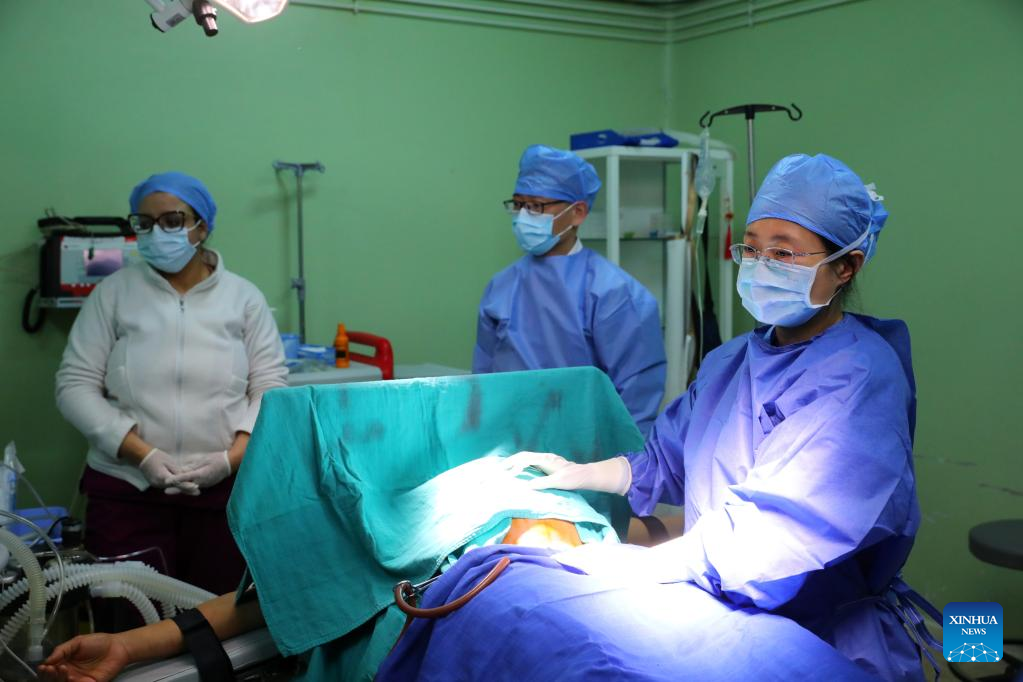
Chinese doctor Zhou Long (R) performs a cesarean at the Hassan II hospital in Settat, Morocco, on Feb. 27, 2023. For nearly half a century, Chinese doctors, mainly obstetrician-gynecologists, have earned a sterling reputation for their professionalism and dedication in some remote areas of Morocco. Many pregnant women from across the country come to seek medical advice and childbirth care from them. (Xinhua/Sui Xiankai)
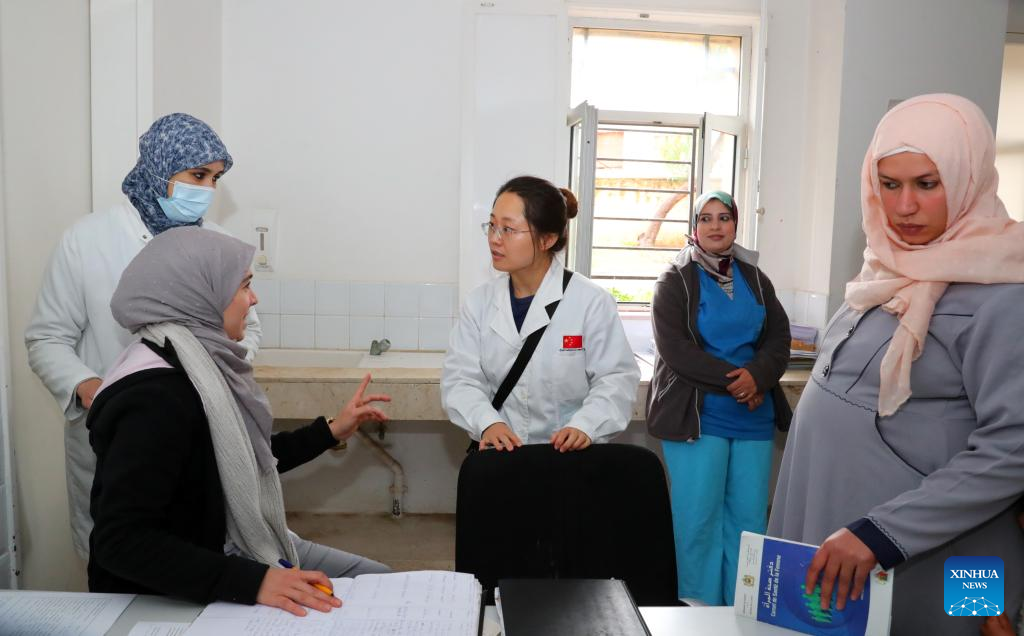
Chinese doctor Zhou Long (3rd L) speaks with Moroccan medical workers at the Hassan II hospital in Settat, Morocco, on Feb. 27, 2023. For nearly half a century, Chinese doctors, mainly obstetrician-gynecologists, have earned a sterling reputation for their professionalism and dedication in some remote areas of Morocco. Many pregnant women from across the country come to seek medical advice and childbirth care from them. (Xinhua/Sui Xiankai)
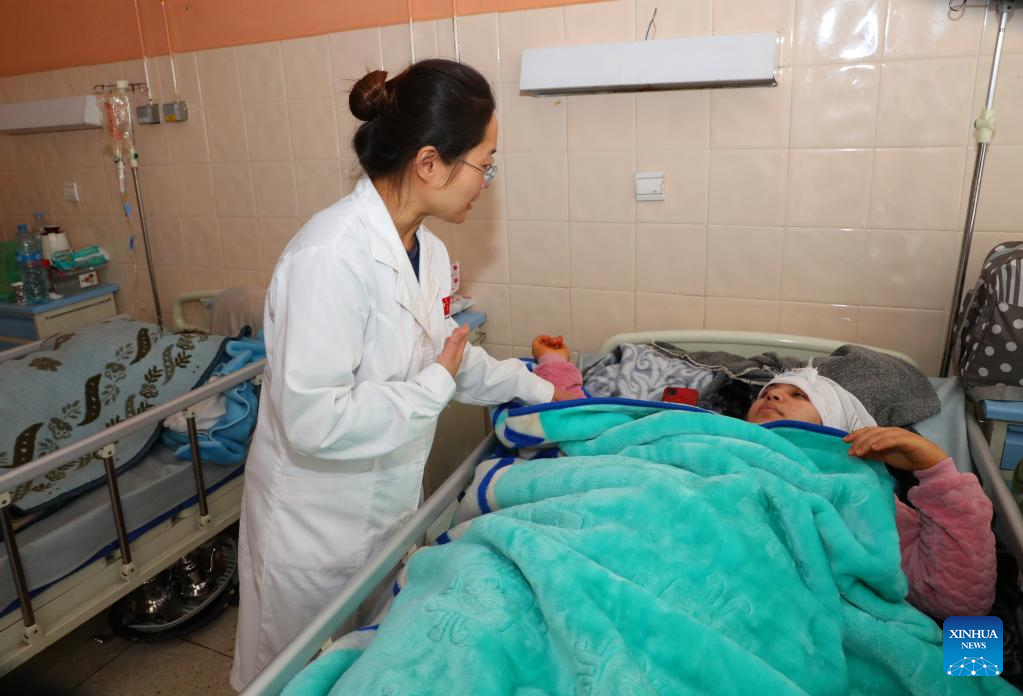
Chinese doctor Zhou Long (L) sees a patient at the Hassan II hospital in Settat, Morocco, on Feb. 27, 2023. For nearly half a century, Chinese doctors, mainly obstetrician-gynecologists, have earned a sterling reputation for their professionalism and dedication in some remote areas of Morocco. Many pregnant women from across the country come to seek medical advice and childbirth care from them. (Xinhua/Sui Xiankai)
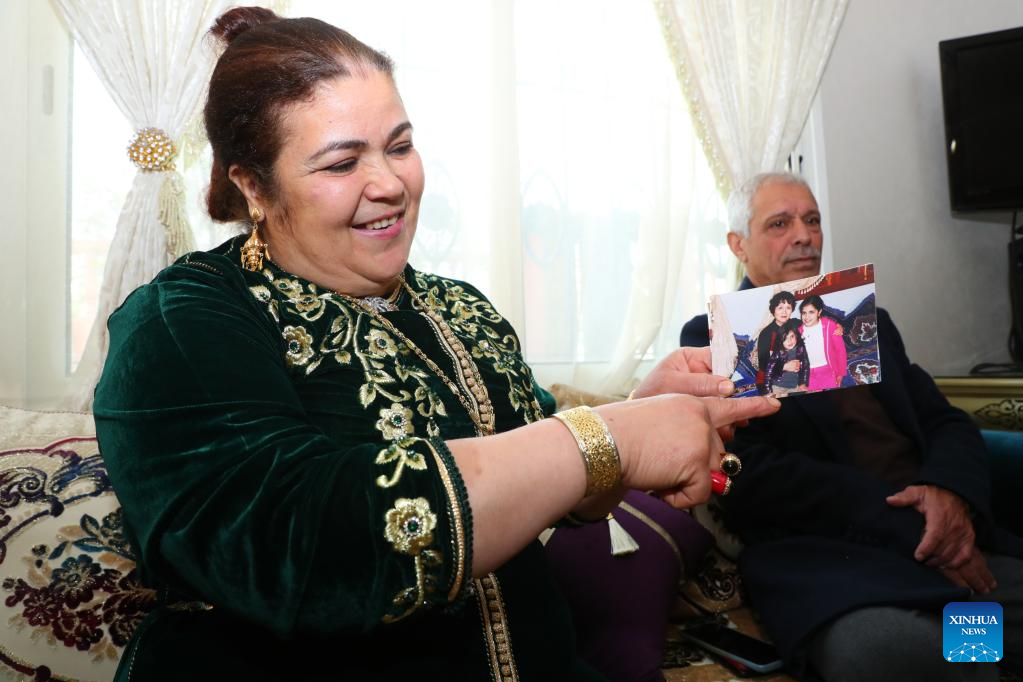
Fatima Laatiq (L), a resident in Settat, shows an old photo that her family took with a Chinese doctor at her home in Settat, Morocco, on Feb. 27, 2023. For nearly half a century, Chinese doctors, mainly obstetrician-gynecologists, have earned a sterling reputation for their professionalism and dedication in some remote areas of Morocco. Many pregnant women from across the country come to seek medical advice and childbirth care from them. (Xinhua/Sui Xiankai)
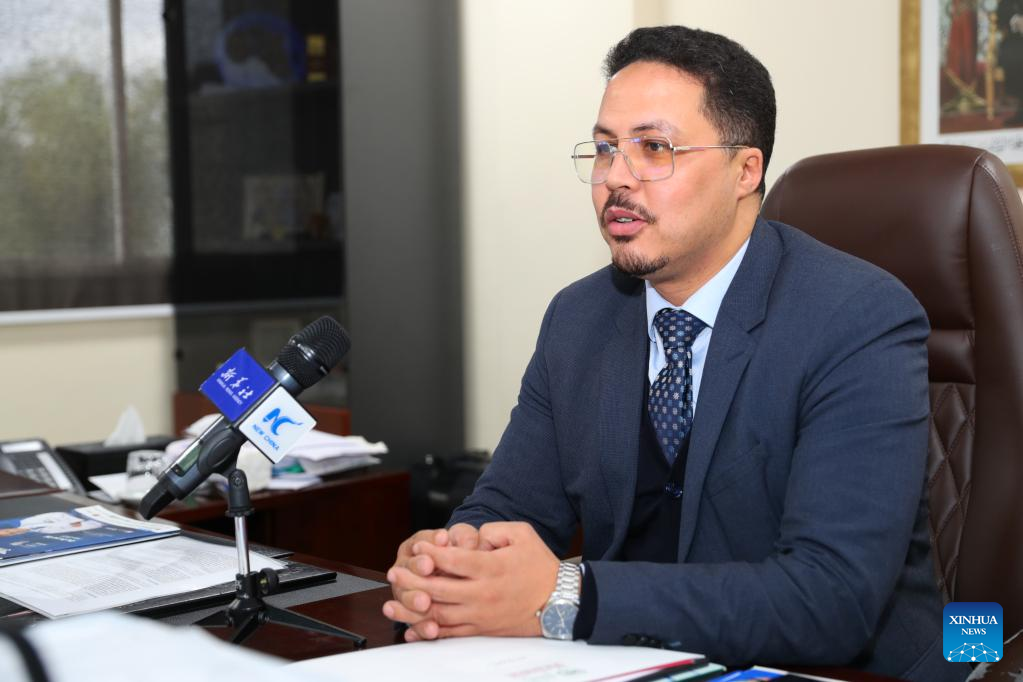
Belmadani Abdelouahab, director of planning and financial resources in the Moroccan Ministry of Health, speaks during an interview with Xinhua in Rabat, Morocco, Feb. 28, 2023. (Xinhua/Sui Xiankai)
